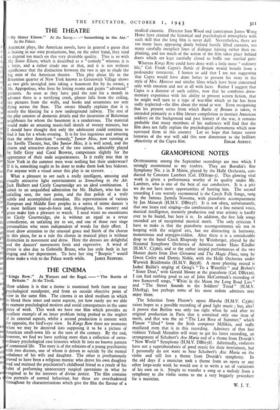ME CINEMA How seldom it is that a theme is
examined both from an inner sychological standpoint, and from an outside objective point of ew in the same film. The cinema is an ideal medium in which • to blend these inner and outer aspects, yet how rarely are we able o examine psychological motives and social consequences in the same • piece of work. This week we have one film which provides an xcellent example of an inner problem being probed to the neglect of its external aspects, whilst a second production is content with the opposite, the bird's-eye view. In Kings Row there are moments • hen we may be deceived into supposing it to be a picture of
1-1 erican small-town life at the turn of the century. By the end, owever, we find we have nothing more than a collection of extra- rdinary psychological case histories which fit into no known pattern
• f communal life. The story is of the relations of a young psychiatrist ith two doctors, one of whom is driven to suicide by the mental nbalance of his wife and daughter. The other is posthumously • roved to have been a religious maniac who drove his own daughter ad and maimed the psychiatrist's childhood friend as a result of his abit of performing unnecessary surgical operations in what he inagined to be the interests of divine justice. The film contains so portraits of normal behaviour, but these are overshadowed hroughout by characterisations which give the film the flavour of a medical causerie. Director Sam Wood and cameraman James Wong Howe have created the historical and psychological atmosphere with such skill that the long film is never dull. Nevertheless, there are too many faces appearing dimly behind hastily lifted curtains, too many carefully inexplicit lines of dialogue hinting rather than ex- plaining, and too much of the action of the film takes place behind doors which are kept Carefully closed to baffle our startled gaze.
Whereas Kings Row could have done with a little more "ordinary life," Col. Frank Capra's Battle of Britain would benefit from a profounder treatment. I hasten to add that I am not suggesting that Capra would have done better to present his story in the style of Mrs. Miniver and similar films which have been concerned only with emotion and not at all with facts. Rather I suggest that Capra is a director of such calibre, now that he combines docu- mentary experience with his ability to present screen fiction, that he might well turn to a type of war-film which so far has been sadly neglected—the film about the mind at war. Even recognising that his present series from which Battle of Britain is taken, is intended primarily as a film library compilation to instruct American soldiers on the background and past history of the war, it remains probable that many members of his audiences will find that the film does not fully explain the psychological phenomena which now surround them in this country. Let us hope that future screen histories of the war will add this new dimension to the brilliant


























 Previous page
Previous page